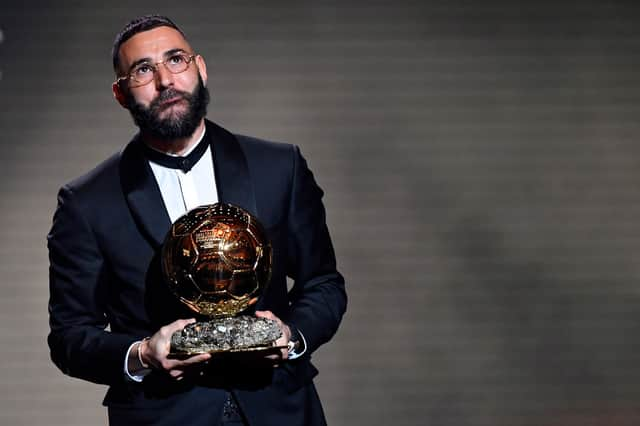Why Karim Benzema’s Ballon d’Or win is watershed football moment


During the unseasonably damp summer of 2007, as rain fell ceaselessly and the country splashed about in a muddled, soggy haze, there was simply no way of going about your daily routine without being forcefully subjected to a song about an umbrella. Rihanna’s all-conquering number one single took on a kind of omnipresent inevitability over the course of its 10-week reign at the top of the charts, piped, as it was, through car radios, supermarket PA systems, and tinny Nokia speakers until it eventually rose up against and usurped the constant babble of your internal monologue. There was no peace.
Or at least, there wasn’t until US super-producer Timbaland booted RiRi from her perch with his grammatically questionable track “The Way I Are”. It came, it topped the charts for a fortnight, it left us alone. Order was restored.
Advertisement
Hide AdAdvertisement
Hide AdIn 2007, Karim Benzema was a youth player in Olympique Lyonnais’ academy system. Fifteen years later, he is a Ballon d’Or winner at the age of 34, and perhaps the footballing equivalent of Timbaland’s comparatively brief chart-topper. The Frenchman becomes the first attacking player other than Lionel Messi or Cristiano Ronaldo to win the prestigious title since 2004, and only the second to break that towering duopoly after Luka Modric.
His is a deserved acknowledgement too. Benzema played an integral part in Real Madrid’s Champions League and La Liga double this year, and his total of 44 goals and 15 assists in 46 games is impressive even in the context of the bloated excesses of Messi and Ronaldo’s respective legacies. But it’s hard to envisage him cradling that famous golden ball too many more times.
You see, Benzema has the distinct feel of a transitional champion, an ageing prince regent handed the keys to the kingdom while some infant nephew or other waits to be bestowed with something approaching cognisance. Before him is a double act whose supremacy is eclipsed only by Ant and Dec’s stranglehold on the NTAs, behind him is a gaining mob of precocious wunderkinds fronted by a blonde Scandinavian with mild emo energy. Fitting really; Timbaland was deposed at the top of the charts by Robyn, after all.
A whole generation of elite players have been starved of the Ballon d’Or by the otherworldly exploits of Messi and Ronaldo. The likes of Neymar, Mo Salah, and Kevin De Bruyne all would have been shoe-ins for the top prize had they been born 20 years earlier. Spare a thought for Robert Lewandowski in particular; the Pole scored 64 goals in 54 outings last year and all he got was an afterthought of an award that felt like a petrol station bouquet on a forgotten wedding anniversary and looked like a spray-painted poppadom.
Advertisement
Hide AdAdvertisement
Hide AdBut the times they are a-changin’. Ronaldo only just scraped into the top 20 of this season’s standings (and even that felt generous), while Messi was nowhere to be seen on the final shortlist. All of this year’s top five are aged 30 or over. Sooner or later, the Erling Haalands and Kylian Mbappes of this world are going to start eking out more and more of the limelight.
In that regard, Benzema’s recognition might end up being something of an anomaly. But it may also represent a watershed moment in the post-millennium history of the game.
Comment Guidelines
National World encourages reader discussion on our stories. User feedback, insights and back-and-forth exchanges add a rich layer of context to reporting. Please review our Community Guidelines before commenting.
